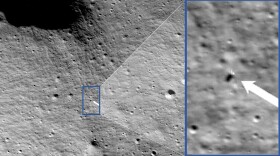-
MOSI's new planetarium takes the place of the IMAX theater, which hasn't been used since 2017.
-
Pending confirmation by the Senate, space policy expert and educator Greg Autry will play an influential role in shaping the financials and future of the federal agency.
-
Three NASA astronauts and a Russian cosmonaut will spend about six months on the International Space Station - conducting experiments and research. They'll relieve four people of the Crew-7 mission.
-
The first U.S. spacecraft to land on the moon since the Apollo astronauts has fallen silent, a week after breaking a leg and tipping over near the lunar south pole.
-
Three astronauts and a cosmonaut will launch into space for their crew rotation.
-
The first private U.S. spacecraft to land on the moon broke a leg at touchdown before falling over.
-
A private U.S. lunar lander is expected to stop working Tuesday, its mission cut short after landing sideways near the south pole of the moon.
-
The treatment involves implanting electrodes in the brain that are attached to a device placed under the skin in the chest. Recent research is promising, and doctors believe federal approval may come soon.
-
A U.S. company says its moon lander ended up on its side near the lunar south pole. It rocketed from Kennedy Space Center on Feb. 15.
-
NASA’s Commercial Lunar Payload initiative, or CLPS, is changing the way science gets to the moon. By relying on commercial partners, NASA can send more science to the lunar surface and at a much faster rate. Jim Gregory, Dean of the College of Engineering at Embry Riddle Aeronautical University, said the CLPS initiative will have a positive trickle down effect on the Space Coast economy.
-
Another private U.S. company is taking a shot at the moon, launching a month after a rival's lunar lander missed its mark.
-
The Falcon rocket headed south over the Atlantic from Cape Canaveral to achieve a rare polar orbit. It will spend at least three years studying the oceans from 420 miles up, as well as the atmosphere.
-
A group of students are analyzing their science experiment after it was aboard the ISS and landed back on Earth.
-
The countries represented at the conference include Argentina, Brazil, Canada, Chile, Colombia, Ecuador, Mexico, Paraguay, Peru, the United States and Uruguay.















